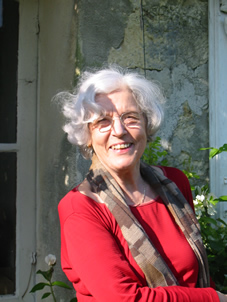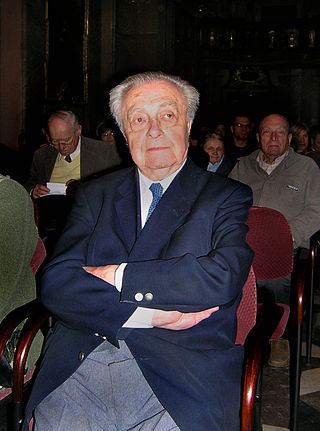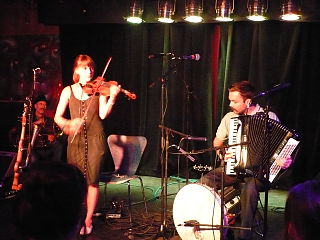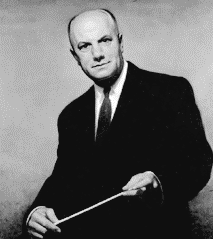Related Research Articles

This is a list of notable events in music that took place in the year 1958.

A concert band, also called a wind band, wind ensemble, wind symphony, wind orchestra, symphonic band, the symphonic winds, or symphonic wind ensemble, is a performing ensemble consisting of members of the woodwind, brass, and percussion families of instruments, and occasionally including the harp, double bass, or bass guitar. On rare occasions, additional, non-traditional instruments may be added to such ensembles such as piano, synthesizer, or electric guitar.

La sonnambula is an opera semiseria in two acts, with music in the bel canto tradition by Vincenzo Bellini set to an Italian libretto by Felice Romani, based on a scenario for a ballet-pantomime written by Eugène Scribe and choreographed by Jean-Pierre Aumer called La somnambule, ou L'arrivée d'un nouveau seigneur. The ballet had premiered in Paris in September 1827 at the height of a fashion for stage works incorporating somnambulism.

David Albert Alvin is an American singer-songwriter, guitarist and producer. He is a former and founding member of the roots rock band the Blasters. Alvin has recorded and performed as a solo artist since the late 1980s and has been involved in various side projects and collaborations. He has had brief stints as a member of the bands X and the Knitters.

Elizabeth Jolas is a Franco-American composer.
The "Flower Duet" is a duet for soprano and mezzo-soprano in the first act of tragic opera Lakmé, premiered in Paris in 1883 and composed by Léo Delibes, a French Romantic composer best known for his ballets and operas.

Songs to Grow on for Mother and Child is a collection of children's music by folk singer Woody Guthrie. Recorded in 1947 and first released in 1956 by Folkways Records, a remastered recording was issued by Smithsonian Folkways in 1991.

Ilja Hurník was a Czech composer and essayist.
Chen Yi is a Chinese-American composer of contemporary classical music and violinist. She was the first Chinese woman to receive a Master of Arts (M.A.) in music composition from the Central Conservatory of Music in Beijing. Chen was a finalist for the 2006 Pulitzer Prize for Music for her composition Si Ji, and has received awards from the Koussevistky Music Foundation and American Academy of Arts and Letters, as well as fellowships from the Guggenheim Foundation and the National Endowment for the Arts. In 2010, she was awarded an Honorary Doctorate from The New School and in 2012, she was awarded the Brock Commission from the American Choral Directors Association. She was elected to the American Academy of Arts and Letters in 2019.

Frank Ticheli is an American composer of orchestral, choral, chamber, and concert band works. He lives in Los Angeles, California, where he is a Professor Emeritus of Composition at the University of Southern California. He was the Pacific Symphony's composer-in-residence from 1991 to 1998, composing numerous works for that orchestra. A number of his works have become standards in concert band repertoire.

A Hawk and a Hacksaw is an American folk duo from Albuquerque, New Mexico, currently signed to L.M. Duplication. The band consists of accordionist Jeremy Barnes, who was previously the drummer for Neutral Milk Hotel and Bablicon, and violinist Heather Trost. The music is inspired by Eastern European, Turkish and Balkan traditions, and is mostly instrumental. They have released six albums and have toured internationally. The first four albums and an EP were released on The Leaf Label and afterwards on their own label L. M. Duplication.
"Mrs. McGrath" is an Irish folk song set during the Peninsular War of the early 19th century. The song tells the story of a woman whose son enters the British Army and returns seven years later having lost his legs to a cannonball while fighting against Napoleon presumably at the Battle of Fuentes de Oñoro. The general theme of the song is one of opposition to war. Along with "Johnny I Hardly Knew Ye", it is one of the most graphic of all Irish folk songs that deal with sickness and injuries caused by warfare. Irish folk song collector Colm Ó Lochlainn described "Mrs. Grath" as "known to every true born citizen of Dublin". It was very popular among the Irish Volunteers in the years leading up to the 1916 Rising and has been recorded by many singers and folk groups.
This is the discography of Simon Rattle and other produced works by the English conductor.

William D. Revelli was an American music educator and conductor best known for his association with the University of Michigan, where he directed the university's bands including the Michigan Marching Band 1935 to 1971. During his 36 years as director, the Michigan Marching Band won international acclaim for its musical precision. Revelli is also credited with innovations that moved college marching bands across the country away from rigid military formations. Among other things, Revelli’s Michigan Marching Band was the first to synchronize music and movement and the first to use an announcer.
"All the Pretty Little Horses" is a traditional lullaby from the United States. It has inspired dozens of recordings and adaptations, as well as the title of Cormac McCarthy's 1992 novel All the Pretty Horses. The melody is also used in the score of the film Misty of Chincoteague based on the book by Marguerite Henry.
"Ch'io mi scordi di te? ... Non temer, amato bene", K. 505, is a concert aria by Wolfgang Amadeus Mozart for soprano, piano obbligato and orchestra, composed in December 1786 in Vienna. It is often considered to be one of his greatest compositions in this genre.

Julia Gomelskaya was a Ukrainian composer of contemporary classical music.
Bernard Howard Gilmore was an American composer, conductor, French horn player, and Professor Emeritus of music at the University of California, Irvine. He is best known for his compositions, including Five Folk Songs for Soprano and Band which has become a reputable work in contemporary band music repertoire.
References
- Special Collections and Archives, The UC Irvine Libraries, Irvine, California.